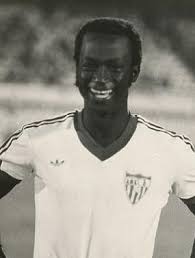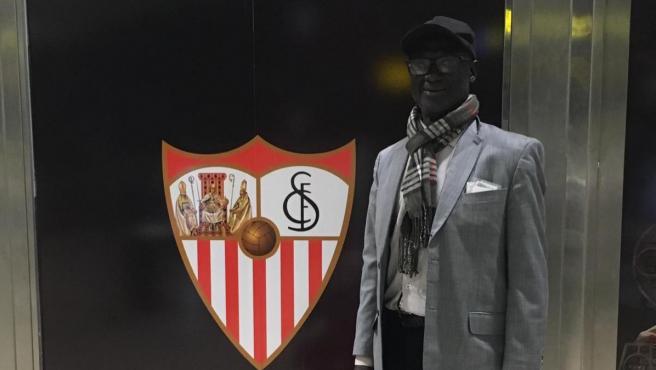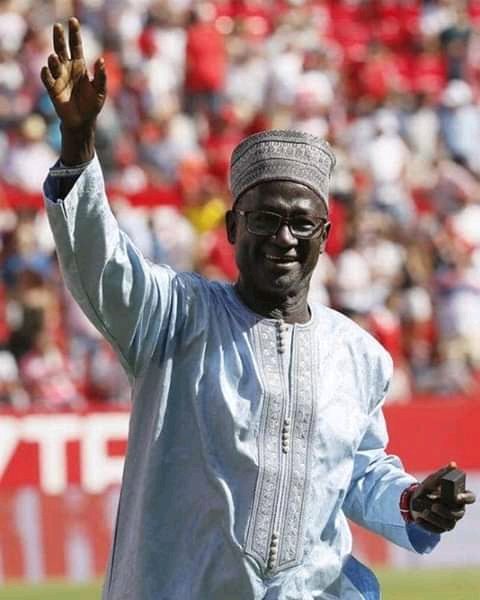
Football Icon ‘s Biri Biri’s Death Reverberates Beyond Football
Inna Lillahi wa inna ilayhi raji’un
I do not mourn legends; I celebrate them.
Shock and a stunned silence washed over the football universe Sunday as the tragic news spread that Alhagie Momodou Njie, known as Biri Biri, had died. Athletes and fans, politicians, and celebrities alike struggled to process the death of an athletic icon whose impact and fame spanned sport and culture.
I know of no death in The Gambia in recent times coping with the death of a legend Alhagie Momodou Njie known as Biri Biri. It has dominated social media conversation and inspired a welter of sustained lamentations with as much undying persistence as Biri Biri’s heartrendingly sudden death in Dakar, Senegal.
Biri was a legend on the football pitch and just getting started in what would have been just as meaningful a second act. Biri Biri one of the most extraordinary players in the history of Gambian football, and he would be remembered most for inspiring people around the world to pick up a football and compete to the very best of their ability.
For many, Biri was a transcendent figure who inspired far beyond any football. Many years ago, he retired from the game but had not shied away from the spotlight, where he lived boldly and unapologetically since he was a phenomenon, poised to become one of Gambia’s biggest stars.

Sub-Saharan Africa and Europe weep, the football community mourns. Biri Biri is the GOAT — Beloved and respected by all. Biri Biri’s death reverberates beyond sports.
Death is a necessary end for all of us, and it comes when it comes. It hardly gives notice nor the room for consultation or negotiations.
For those close to Alhagie Momodou Njie (Biri Biri), I offer my condolences to his family and all football enthusiasts and all the Gambian people.
However, when friends and loved ones die, we are reminded of our vulnerability, being mortals. As Gambians or Africans, our reality is such that as we live, we also must consciously engage the fact that we can die due to age-related frailty, serious illness, and sudden deaths due to calamities.
We shy away from these facts and remain in denial about what the times connote for us. Living itself is a gift. In our case, it has become a gift with an expiry date.
Alhagie Momodou Njie (Biri, Biri) was no politician. He was no wealthy man. He was no king or prince. He was no pop culture celebrity. He was only a footballer and youth mentor who railed and fired our collective imagination about our unrealised but realisable potential as a footballing nation.
However, he was mourned—and is still being mourned—by an unbelievably vast swath of humanity. I do not mourn legends; I celebrate them. I only mourn those who came to this world, existed, and exited without leaving a mark.
However, those who touched hearts with their kindness; those who impacted the world by their all-benefiting actions; those who impressed minds with their wit and charm; those who blessed societies with leadership and direction; those who whose lives affect all others around them, quietly touching one heart which in turn, touches another for generations; those ones never die even when their hearts cease to beat!
Those who gave a little of their lives to each one of us that even when they depart, through us, they live! We will not be getting another legend, but by his life and talent and the rest of his skills in football, many footballers were made, including yours truly, and by his death, we are reminded it is time to fit into the shoes of the giant!

I celebrate you, Biri Biri.Shakespeare said, “When beggars die there are no comets seen; the heavens themselves blaze forth the death of princes.” Biri Biri was no prince, yet the heavens are blazing forth his death. Why has his death detained our imagination and united us in grief?
Was it because when he lived, he radiated so much communicable warmth and love? Was it because he inspired tremendous, transmissible mirth wherever he was? Was it because he exuded life like no one? Was it because he shared love and built bridges across traditional fissures like no one in his generation?
Well, it was all these things and more. He was generous with the wisdom he acquired and saw it as his mission to share with future generations of players, taking particular delight in passing down his love of the game to young people.
Biri let anyone who knew him to peep into his deep, vast, phenomenal mind and see the angst that troubled him. People who cared to look saw a man who was deeply concerned about the present and the future of Gambian football.
We saw the mind of a man who was impatient with the snail-pace progress of Gambian football. We saw a mind that was gripped by the fear of the judgment of history. We saw a man who was prepared to risk being unpopular rather than bend or sugarcoat the truth.
In short, in Alhagie Njie Bi Biri, people saw a complaisant, brilliant, fearless, patriotic yet modest hero in whom we had become intellectually and emotionally dependent.
That was why his death felt like—and actually is— the death of a piece of us.
Giving birth to a legend is difficult, legends are born once: true to that old African wisdom, I am yet to see another Gambian play football like Biri Biri’s dedication, finesse, and flair.
A key man in Gambian football. Biri was decorated against his peers from football powerhouse in Spain, who brought Gambian football to the world stage.
Many years later, I am still waiting for another Biri Biri. A true son of the soil. Biri, you made the Gambia proud. During your playing years, the national team’s jersey became commonplace as it is now with the “Gambia Eleven” national colours from our coat of arms proudly at the front.

Biri Biri, your contribution to Gambian football is written in indelible ink. I will not mourn you, and I will instead celebrate you, Gambian captain emeritus Biri Biri Njie.
Alhagie Momodou Njie (Biri Biri) kept up with and lubricated his vast network of friends through dutiful outreach and relational nourishment. If a milestone happened in your life or something momentous happened to you, and he got to hear of it from others. He will call you and congratulate you.
Nevertheless, he was quick to forgive than he was to take offence. That is why many people who knew him are distressed beyond comforting by the gut-wrenching news of his death. I don’t think I will ever come to terms with his death.
A friend call woke me up this morning. I thought he called to tell me to discuss the FA Cup Semi-Final between Manchester United and Chelsea and got a good laugh clowning. Instead, he told me Bir Biri had died in Banjul. Because I was still in bed and not quite awake when I answered his call, I thought I was having a nightmare from which I would wake up.
So I called him back a couple of hours later to confirm if he actually called to tell me Biri Biri had died. I was hoping against hope that it wasn’t right. He said I wasn’t dreaming.
In many ways, Biri Biri reminds us of all of the intrinsic impermanence of our very humanity and the imperative to always be self-conscious of our mortality.
In many discussions with friends, Biri Biri often said he had a foreboding that he would not live long enough to see the Gambia participate in the African Cup of Nations and FIFA World Cup Finals. That was why he lived every day as if it was his last.
He always knew and said that tomorrow isn’t guaranteed. That was why he always stood on the side of truth, justice, and fair play.
More than anything, Alhagie Momodou Njie’s (Biri Biri) commitment to these ideals earned him universal admiration and why we have a hard time accepting that he is physically gone from us for good.
However, he lives in the hundred and thousands of lives he inspired and in the ideals he passionately espoused. May his soul rest in peace and his family be comforted.
May Allah grant him Alijannah Firdausi. Ameen.
By Alagi Yorro Jallow











Recent Comments